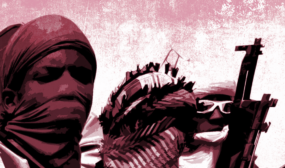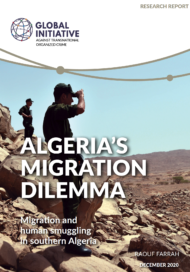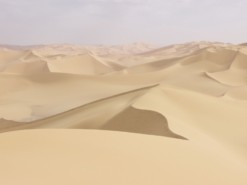Posted on 21 Sep 2018
As routes used by cocaine traffickers shift to North Africa, a large cocaine shipment intercepted in Algeria has roiled the country’s security services and Algerian politics.
Africa is no stranger to cocaine trafficking. For about two decades, the continent has been used by drug-trafficking organizations seeking to transport their product securely from South America to the lucrative European consumer markets. West Africa and the Sahel have borne the brunt of the cocaine trade, which has spurred a rise in local addiction, corrupted institutions and hobbled governance.
Cocaine trafficking continues, but the routes used by traffickers are changing. Over the last two years, North Africa has emerged as Africa’s epicentre for cocaine seizures and the site of the only cocaine conversion laboratory uncovered on the continent. The three largest cocaine seizures recorded in the region this century occurred between 2016 and 2018, including two in Morocco.
North Africa saw the region’s third largest cocaine seizure in May 2018, when Algerian coastguards raided a ship docked in the western port of Oran. They found 701 kilograms of cocaine buried in a container of frozen meat. Linked to local businessman Kamel Chikhi – aka ‘the Butcher’ – the shipment underscores the growing role North Africa has been playing as a narcotics transshipment point and the risk of corruption that such trafficking brings.
The Butcher’s shipment
The Oran cocaine shipment can be traced to the Brazilian port of Santos, where, in April, a container with the hidden drugs was loaded aboard the MSC Amalfi. It was one of 15 containers of frozen meat. The shipment seemed routine, as Chikhi owned at least two meat import companies and had contracted with a Brazilian company over the last seven years for halal meat. The containers were offloaded in Valencia, Spain, on 23 May, where they were reportedly searched by Spanish police and customs officials.
The results of this search are unknown, but Spanish authorities allowed the containers to be loaded onto a second vessel, the Vega Mercury, which then departed for Algeria. After waiting in Oran’s harbour for four days, the ship was raided and the cocaine shipment found by Algerian forces, reportedly acting on a tip-off from Spain.
Chikhi, his brothers, several business associates and members of the ship’s crew were promptly arrested. But it did not end there – a number of others were implicated, including prosecutors, the son of a former Algerian prime minister, and a driver for the national police chief, General Abdelghani Hamel, who was dismissed from duty by the president.
The fallout from this incident has seemingly catalyzed a broad shake-up in Algeria’s security and defence apparatus. This, in turn, has impacted, and probably been driven by, political competition and positioning in advance of Algeria’s 2019 presidential election. The Chikhi affair has already led to the removal of some powerful figures, most notably Hamel, an ally of and potential successor to President Abdelaziz Bouteflika, and Major General Habib Chentouf, an army officer seen as a potential successor to the current army chief of staff.
The ultimate impact of the Chikhi affair has yet to be seen, but its effect has been to increase tension among Algeria’s elites and complicate an already tightly contested election.
The new Côte de Cocaïne
Chikhi’s shipment of cocaine was not the first to be seized in Algeria, but it is the largest. The size of the shipment suggests that the trafficking route connecting South America to Europe via Algeria is already well established. There is a risk that this route, as well as those through Morocco and other North African countries, will become more popular for traffickers in the coming years.
This is due to various factors. The traffickers need to access the European cocaine market, which, valued at €5.7 billion, is the second largest globally. Numerous logistics links – planes, ferries and commercial ships – connect the southern rim of the Mediterranean to the southern edge of Europe, with large numbers of people and volumes of goods moving between the two on a daily basis. These licit transport links offer significant benefits to drug traffickers, who, as in the Chikhi affair, can hide drug shipments among other commodities.
Traffickers are also being driven to North Africa because of the growing risks they face along the established trafficking routes through the Sahel and the Sahara. In recent years, the number of armed groups, including terrorists, insurgents and militias, operating in areas transected by these routes has steadily risen. International actors, including the French, Americans and the UN, have consequently deployed in the region, focusing surveillance there. Both these sets of groups pose a threat to drug traffickers’ operations, and have most probably played a role in the recent diversion of trafficking routes to North Africa.
Neither the lucrative Europe cocaine market nor conflict in the Sahel and Sahara is likely to change significantly in the near future. Hence, there is a distinct likelihood that cocaine trafficking through North Africa will continue, and probably increase, in the years to come.
Cocaine and corruption in North Africa: Looking ahead
In other areas in which cocaine traffickers have operated, such as Central America and West Africa, the impact of the trade on local communities and states has been significant. This is also likely to be the case in North Africa, though the threats are unlikely to be violent in nature, or even highly visible. There is little likelihood that the region’s relatively small terrorist groups, who are based in remote areas far from the key ports that are essential to the traffickers’ operations, will reap any benefit from the rising incidence of trafficking.
Instead, the main impact of cocaine is likely to be the corrupting effect it will have on regional governments. Work by Global Initiative experts has underscored the corrosive impact that trafficking of cocaine has had on governments in Guinea-Bissau, Mali and Niger, sparking institutional decay, contestation among powerful figures over the narco-dividends and, in some cases, the direct involvement of state officials in drug trafficking.
While profound political and socio-economic differences exist between West African and North African states, that does not render the latter immune to the risk of significant narco-corruption. This was evident in how certain judicial and security officials, and relatives of senior political figures, were implicated in Algeria’s Chikhi affair. But it goes further – the Chikhi affair seems to have become a pretext for high-level competition within the authorities, used by those in power to move against or sideline potential competitors. If cocaine trafficking continues to be a feature in the North African region, it is likely that such institutional impacts of the trade will increase in severity and frequency.
It is essential that North African governments also prepare themselves to deal with local rising cocaine or crack use. Currently, few Algerians or Moroccans use the drug. South American cocaine traffickers, however, often pay local assistants in cocaine – a portion of which often gets sold on into the domestic market. In a number of transit countries, this has spiked local consumption levels.
Due to the potential risks associated with cocaine trafficking, it is important for North African states and the broader international community to maintain strategic alertness on the issue, and be ready to systematically address a range of potential threats associated with cocaine trafficking. Governments must not presume that the Maghreb is an exception to the risk of narco-corruption, government corrosion or cocaine addiction. The cost to the region could be very high. If they are looking to avoid this ‘butcher’s bill’, North African states and the broader international community shouldn’t hope for the best. Instead, they should strategically plan to address the worst – and act accordingly.



